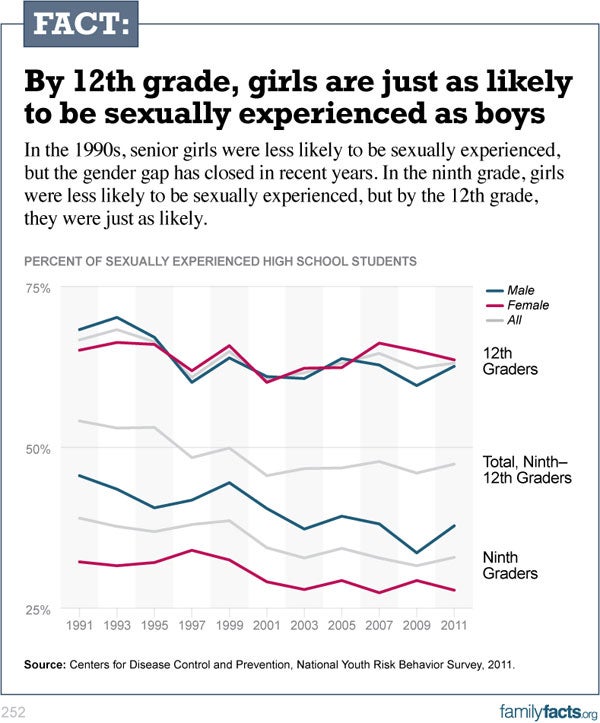Family Fact of the Week: Parents, Pop Culture, and Early Teen Sex
Christine Kim /
Parents instinctively know that the over-sexualized culture promoted by Hollywood is not healthy for their teens. A recent study in the academic journal Psychological Science quantified such concerns.
In the study, researchers from Dartmouth College counted the number of seconds of sexual content in the top 684 grossing movies released between 1998 and 2004. They surveyed over 1,200 young teens, initially between age 10 and 14, across the country about their movie-watching to determine how many hours of sexual content to which they have been exposed.
On average, teens in the sample had been exposed to 0.93 hour of such material. The study then followed these teens over a six-year period and queried about their sexual activity. (continues below chart)
The researchers found that for each additional hour of exposure to sexual content in movies, the risk of initiating sex at each age increased more than five times. The increased risk between teens with high exposure and those with low exposure widened significantly during the later teenage years. The effect was also stronger for boys than girls.
The study accounted for the teens’ age, race, gender, family structure, religious participation, hours of television watched, having a TV in their bedrooms, a measure of their thrill/adventure seeking and boredom susceptibility (or “sensation seeking”), and reports of their mothers’ parenting characteristics.
Further analysis revealed that the effect of movie sexual content on the age of sexual initiation was both direct and indirect through increased sensation seeking. Moreover, exposure to such material also directly and indirectly increased the likelihood of risky sexual behavior (the overall number of sexual partners and casual sex without condom use) in young adulthood through increased sensation seeking and early onset of sexual activity.
The study also found that having a TV in the teen’s bedroom and a higher score on the sensation-seeking measure was linked to increased risk of sexual initiation. However, living in an intact home during the early teenage years was associated with reduced risk, which is consistent with decades of research that suggests the intact family structure protects teens from early initiation of sexual activity and risky sexual behavior.
The research strongly supports what many already know: that the parent factor in teen sex is critical—specifically an intact family structure, parents’ disapproval of adolescent sex, teens’ sense of belonging to and satisfaction with their families, parental monitoring, and (to a lesser extent) parent–child communication about teen sex and its consequences. Teen sexual activity has led to a number of public policy challenges, including unwed childbearing and sexually transmitted diseases.
When it comes to protecting our teens and keeping them healthy and safe, the solutions should begin at home. Policy should respect parents’ authority to do just that.


